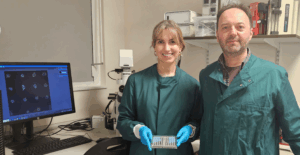We’re thrilled to present the second instalment of our TRICAPITAL member’s spotlight, featuring Professor Lynne Cadenhead, BSc. MBA. With over 25 years of experience in entrepreneurial ventures, equity investment, and policy shaping, Professor Cadenhead, currently leading her third start-up, Immaculate Drinks, brings valuable insights.
In this spotlight, we explore her journey into venture capital, her recent appointment as TRICAP’s Women’s Advocate, her contributions to Women’s Enterprise Scotland, and her plans to encourage women’s involvement in angel investing.
Can you begin by giving us a brief overview of your background, a quick career snapshot?
My journey began in the field of life sciences, where I specialised as a molecular geneticist. After several years in research, I transitioned into sales and marketing within the pharmaceutical industry, working for one of the world’s largest pharmaceutical companies. During my tenure, I had the opportunity to launch two cardiovascular New Chemical Entities (NCEs). Following this, I moved back to Scotland and served as the marketing lead for the Scottish Biomedical Foundation, facilitating the commercialisation of life sciences research across a collaboration of Scottish universities, with a specific focus on US and Japanese markets.
I then went into venture capital, managing two early-stage venture capital funds that invested in technology companies spanning sectors such as photonics and life sciences. Subsequently, I embarked on a portfolio career, working with start-ups funded by Business Angels in Scotland. I finally became an entrepreneur myself, currently on my third start-up, after experiencing one spectacular failure, and one pretty successful one, I’m working on the third one being the best!
What drew you to go into venture capital?
If I look back on my career, my passion for life sciences has always been a driving force. The pivotal moment came in my fifth year at school when I first learned about DNA, sparking a significant shift in my career aspirations. Simultaneously, my exposure to the business side of research and my enthusiasm for communication (including my stint as a local radio DJ!) led me to explore the intersection of life sciences and business.
Pursuing an MBA further augmented my business acumen, and the move into venture capital enabled me to merge my life sciences background with my business interests.
Could you share what initially attracted you to join TRICAPITAL? What opportunities or aspects of TRICAP’s mission resonated with you?
I’ve always been really interested in early-stage investment. I co-founded Mint Ventures, a women-led angel group, and my experience within the sector aligns well with TRICAPITAL’s ethos.
What specifically drew me in were two key factors. Firstly, TRICAPITAL’s focus on life sciences opportunities is a field close to my heart. Secondly, their unique approach to viewing portfolio companies as clients intrigued me. This perspective, articulated by Moray, the Managing Partner, emphasises a level of client care which really inspires me.
Personally, my expertise in governance, as a Visiting Professor in Governance and Enterprise at Edinburgh Napier University, has highlighted the crucial role that good structures and processes play in business growth. Establishing the right governance structures at the right time is fundamental for start-ups, preventing challenges during crucial stages like exits or fundraising.
As the newly appointed Women’s Advocate at TRICAP, could you outline some of your key goals and objectives in advancing diversity and inclusion within the angel investment community?
I firmly believe in Christine Lagarde’s (past Managing Director of the IMF) words that Women’s economic empowerment is not just a moral imperative, it’s an economic imperative’. It’s not just about doing what is morally right; it’s about recognising that achieving balance in society and in business benefits everyone. A more balanced business ecosystem is crucial, especially in the start-up community in Scotland, where angel funding plays a pivotal role.
One of the community’s primary objectives is to promote a more balanced representation of women-led businesses. Currently, only 23% of employer-led businesses in Scotland are led by women, and collectively we aspire to see this figure rise to 50%. To achieve this goal, we need specific interventions that support women entrepreneurs, meeting their development needs in a gender-friendly way, particularly in sectors that traditionally lack angel investor support.
And we need more women business angels making their own investment decisions. Women possess all the skills, contacts, and competencies required to be successful business angels, yet many are unaware of this exciting investment arena, nor of the financial benefits to be realised from SEIS and EIS. Education, awareness and collaboration are key.
At TRICAPITAL, we aim to facilitate more meetings, discussions, and opportunities to inform and involve women in business angel investment. By providing these platforms, we will bridge the knowledge gap and encourage more women to participate actively in angel investing.
I’d love to hear more about your work with Women’s Enterprise Scotland.
Women’s Enterprise Scotland (WES) focuses on creating a better environment for women entrepreneurs to start up and thrive. We address several crucial areas, including access to finance, networking, mentoring, data and gender-specific support.
Access to finance stubbornly persists as the foremost barrier for women entrepreneurs, hence the need for targeted interventions. Combining this with high visibility of real and relevant role models – both women entrepreneurs and women business angels – is a powerful inspiration and driving force behind achieving gender balance. You cannot be what you cannot see.
We also underscore the significance of Gender-Specific Training for all. It’s not about creating a tokenistic environment; it’s about meaningful and impactful engagement. Using the right language, tone and approach, we steer clear of superficial ‘pink-it and shrink-it’ initiatives, ensuring that the support provided is tailored to a woman’s specific needs.
Gender-disaggregated data analysis is another key area of focus – what’s measured is managed. We’ve already signed TRICAPITAL up to the UK-wide Investing in Women Code, providing a baseline to measure progress and identify areas for improvement in access to finance.
Our goal is to bring about transformational, long-term and systemic change in support for women entrepreneurs, fostering a thriving and inclusive entrepreneurial landscape.
How do you plan to leverage your extensive experience networks to actively encourage and support the involvement of women in angel investing, especially within TRICAP?
It’s about proactive networking—not just talking but facilitating real connections. Demystifying the challenges that women might face when either raising investment or starting out as investors.
I am starting by proposing quarterly lunches, where experienced women angel investors can bring along others who might be interested in starting their investment journey. These events will serve as platforms for insightful discussions on entering the world of angel investing and facilitate mutual learning. By actively promoting awareness and fostering supportive networks, we can truly empower more women to venture into the world of angel investing, fostering a diverse and vibrant entrepreneurial community within TRICAPITAL.
I will also leverage my recent Honorary Doctorate with the Open University for services to gender equality in business, as well as my past IOD Scotland Award for Diversity and Inclusion.
Considering your substantial experience and leadership in the life sciences sector, what valuable advice would you offer to women interested in pursuing careers or investments in this field?
To women aspiring for careers in the life sciences sector, my advice would don’t be myopic in your viewpoint. Many women might not be aware of the diverse paths available to them. For instance, the emergence of AI in combination with life sciences present exciting business opportunities. And there is a terrific amount of support available through UK and European, all of which have a clear focus on improving gender balance in STEM sector. It’s about tapping into these resources and recognising the myriad of possibilities within the field.
Can you share a recent accomplishment or success story related to your work as a women’s advocate within angel investing or within the life sciences sector that stands out to you?
I was the Co-founder of Mint Ventures, a women’s angel investment group offering a fresh approach to make angel investing more accessible for women and TRICAPITAL was instrumental to Mint’s first deal. It was for Heero, a Scottish-based intelligent software that delivers net-zero homes. It was a terrific collaboration and I’m keen to see a lot more of that happening. I’m looking forward to taking on my new role as Women’s Advocate at TRICAPITAL and what I can bring to the role.
Lastly, based on your experience, what advice would you offer to other syndicates and businesses looking to implement effective strategies for inclusion and diversity within their organisations?
Fostering inclusion and diversity begins with collaboration. In Scotland, we’re fortunate to have a highly collaborative business angel community. It’s about amplifying these efforts, collaborating with other groups, and sharing insights. I strongly advocate for every organisation to sign up to the Investing in Women Code. By understanding the baseline situation through data, you can implement targeted strategies for improvement.
Additionally, it’s crucial to create accessible networking opportunities for women, ensuring they are aware of angel investment as a viable opportunity, irrespective of their career and life stage.










